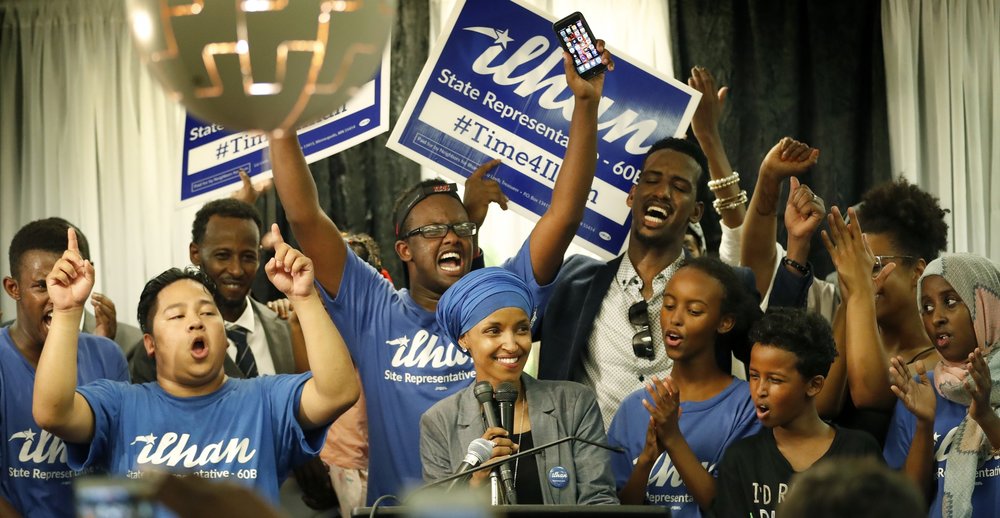Somali born American poised to be first Somali legislator in the US

A Somali born community mobiliser Ilhan Omar is poised to become the first Somali- American in legislator in the US next year following a historic win Tuesday in the fiercely competitive DFL primary in a Minneapolis House district.
Her victory was all the more remarkable for beating DFL Rep. Phyllis Kahn, a historic figure in her own right who is tied for the longest-serving legislator in state history.
Born in Somalia, Omar, 33, and her family escaped civil war and lived for four years in a Kenyan refugee camp before ultimately moving to the Somali-American neighborhood of Cedar-Riverside, where she has lived for nearly two decades and is currently director of policy initiatives at Women Organizing Women.
Chants of “Ilhan” rung out as Omar walked in to a celebration Tuesday night, grinned, wiped away tears and held one of her three children close to her side on her way to a stage. Revelers had to be ushered off the stage.
“Tonight we made history,” Omar told the crowd. “Tonight marks the beginning of the future of our district, a new era of representation. Tonight is about the power of you.”
She choked up as she thanked her father, husband and children and her late grandfather, whom she credited for teaching her about representative democracy. Many in the audience wiped away tears.
“It is with tremendous gratitude that I accept the nomination. I pledge to represent you with integrity and humility,” she said, promising to be a progressive champion.
Afterward, she gave another victory speech in Somali.
Former Minneapolis Mayor R.T. Rybak, who endorsed Omar earlier this year, applauded Omar. “From a refugee camp to the State Capitol with intelligence and insight,” he said. “This is a wonderful story to tell as Americans, and a great source of pride for the state of Minnesota’s open arms.”
Kahn praised Omar in what was a wide open and unpredictable battle where none of the three candidates seemed to have a lock. Omar also topped Mohamud Noor, a Somali-American computer scientist and activist.
“Ilhan obviously ran a very good campaign and mobilized a lot of people that we didn’t see before in previous elections,” Kahn said after the results were in.
She said that her own election in 1972 had been historic and “this is a new historic event … our district is the home of historic events.”
In November, Omar will face Republican Abdimalik Askar, an educator and community activist.
Voters said they believed Omar could deliver change.
Hassan Abdi, 25, voted for the first time on Tuesday, driven to the polls by his concern for jobless young people and his belief that Omar can help. “We need leaders who can change our community,” said the resident of Cedar-Riverside, who works for UPS. “Too many young people are going around with no jobs.”
Abdi, originally from Somalia, also said he has rallied behind Omar for cultural reasons. “In my home country, men have the power,” he said. “This is an opportunity to show that women can do what a man can do.”
Omar’s dramatic victory threatened to overshadow another upset, this one from 24-year-old Fue Lee, who was born in a refugee camp in Thailand and currently works in the office of Secretary of State Steve Simon. He defeated 10-term incumbent Rep. Joe Mullery, DFL-Minneapolis.
Both upsets came in heavily DFL districts, which means they are virtually assured of victory in November.
Their victories illustrated the ascendance of minority populations in the DFL, as new immigrants and African-Americans demand a higher profile and a seat at the table of the party they call home.
Republicans also saw two long-serving legislators go down to defeat in their primaries.
Rep. Tom Hackbarth, R-Cedar, lost to Cal Bahr, who had been endorsed at the local GOP convention.
Sen. Sean Nienow, R-Cambridge, lost to Mark Koran.
Other incumbents, most notably House Speaker Kurt Daudt, R-Crown, survived primary challenges. Despite a flood of money spent to defeat him, Daudt won a convincing victory over military veteran Alan Duff.
Anecdotal reports from polling stations confirmed expectations of low turnout due to the absence of a statewide race for governor or U.S. Senate this year, as well as Minnesotans’ summer tradition of heading to summer cabins where politics can seem far away.
“It’s been pretty light,” said Douglas Ackerman, an election judge at South Suburban Evangelical Free Church in Apple Valley.
The polling place saw just a trickle of voters throughout the morning and afternoon. By 3 p.m., just 100 people had cast votes at that location. Ackerman said he expected about 200 votes to be cast.
Intensity is expected to rev up this fall, when Minnesotans will decide on all 201 legislative districts — 134 in the House and 67 in the Senate.
The Legislature has swung back and forth every two years since 2008. Republicans snatched control from the DFL in 2010; the DFL took both chambers in 2012; Republicans won the House in 2014. The DFL would need to take seven seats to win back the House this year.
The reversals have resulted in significant policy changes, as Republicans sought low taxes and reduced spending, while the DFL-controlled Legislature raised taxes on the wealthy and increased spending on schools, social programs and infrastructure. Gov. Mark Dayton has repeatedly expressed frustration with divided government, while House Republicans currently in the majority have made an explicit appeal to voters that they stand as a check on the taxing and spending of the DFL.
Star Tribune and Goobjoog News